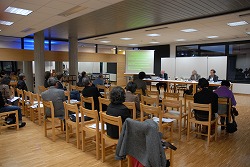Alsace Symposium
Academic Frontier Sub-project 1: “Constructing ‘International Japan-Studies’ to consist of research of other cultures”
International Japan-Studies Symposium
“The Emperor within Japanese Culture: what is the Emperor?”
・Date: Thursday, 30 October – Saturday, 1 November 2008
・Location: Centre Europeen D’Etudes Japonaises D’Alsace (CEEJA) (Kienztheim, France)
・Sponsors: Hosei University International Japan-Studies, Centre National de la Recherche Scientifique, France, and Strasbourg Marc Bloch University Japanese Faculty

This symposium consisted of 15 presentations by seven participants from Japan and eight participants from Europe. Various themes pertaining to the emperor system’s 1500-year history, spanning from the ancient emperor-system to the Showa Emperor, were handled in terms of the wide-ranging academic concerns of history, literature, sociology, philosophy, history of thought, and anthropology. The basic issue from which all presentations set out, and to which they finally returned, was the Japanese Emperor’s unique sacredness which takes the shape of non-administration within real politics. This sacredness, implied in the Nara period Ritsuryo governing system, continues to be supported under the new constitution with its untouchable symbolic emperor.
The following summarized areas are those debated during the symposium: 1) the origins and truth about this sacredness, 2) various secondary cultural devices which contribute to maintaining it, 3) comparative examinations of this sacredness with sacredness in other sovereignty, 4) acceptance by foreigners of this sacredness, and 5) the significance and limitations in the work of thinkers since the modern age began who battled with this sacredness under the influence of Western thought.
Report by: ABIKO Shin
(Director, Hosei University Institute of International Japanese Studies; Professor, Faculty of Letters)


